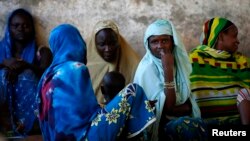A cease-fire deal agreed upon by warring militias in the Central African Republic is a welcome development for the war-torn country, though Implementing the accord will not be an easy task.
Leaders of the rival anti-Balaka militia and the Seleka rebels agreed at meetings in the Republic of Congo to end sectarian violence in the C.A.R.
The deal -- signed Wednesday by various armed groups, members of the transitional government and civil society -- calls for an immediate halt to fighting that has left thousands of people dead and displaced nearly a quarter of the C.A.R.'s population.
Splinter groups abound
While Seleka and anti-Balaka are considered the main actors in the violence, various splinter groups have formed across the country during the past 16 months.
Human Rights Watch Africa researcher Lewis Mudge said that while the deal looks good on paper, getting the various rebel factions to comply will not be easy.
"It's going to be very difficult for them to control all of their respective groups. There is a loose command structure over the Seleka, and there is a very loose command structure over the anti-Balaka. But that in no way means they control all of the soldiers or the combatants that fight in their name," said Mudge.
The conflict began when mostly-Muslim Seleka fighters stormed the capital and overthrew former President Francois Bozize in March 2013 and installed the country's first Muslim president. In response to the coup and ensuing violence, mostly Christian militias formed under the name anti-Balaka, sparking targeted attacks between the two communities.
Human rights
Tens of thousands of Muslims have fled the C.A.R., fearing violence by the Christian majority. Both sides have been accused of serious human rights violations.
Mudge, with HRW, said religious and ethnic divisions opened by the conflict will take time to heal.
"You have homes in Muslim communities that have been literally taken apart brick by brick. So reconciliation, and getting central Africans back to their former communities, are going to be difficult and long processes," he said.
Following the cease-fire agreement, warring factions are now due to begin negotiations on separate proposals for disarmament and the country's political future.













